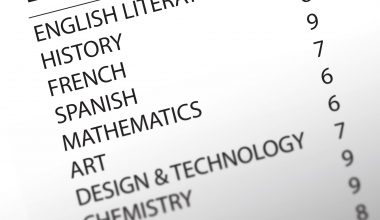When it comes to higher education, the role of mathematics cannot be underestimated. For many students, mathematics can be a daunting subject, and the lack of a Math GCSE qualification may seem like a roadblock in their academic journey.
However, it is essential to understand the importance of mathematics in various fields of study and career paths. Can you go to university without a Maths GCSE?
Mathematics serves as the foundation for several disciplines like engineering, computer science, finance, economics, and even social sciences. It provides students with problem-solving skills, logical reasoning, and critical thinking abilities that are crucial in academic pursuits and professional settings.
In this blog post, we will explore various options available to students without a Maths GCSE qualification. We will delve into foundation courses, access programs, and other alternative routes that can help students bridge the gap and gain the necessary mathematical skills required for their chosen fields of study.
So, if you’re a student who feels discouraged by the absence of a Maths GCSE, fear not. There are still avenues to pursue your dreams and unlock the doors to higher education. Let’s explore these options together and discover how you can embark on your academic journey without maths becoming a barrier.
Table of contents
Why do universities require maths GCSE?
Math is a basic idea that affects most of what we do, even if it is clear that some courses use it more than others. It is therefore a required core GCSE subject if you are applying to study in a UK University.
While we may not know it at first, a lot of the tasks we perform for our A-Levels, university, or jobs involve math, such as figuring out the size of a piece of land or calculating profit and loss. Hence, maths is necessary for practically all courses.
Universities and Courses that Require Maths GCSE
When it comes to pursuing higher education, many students may feel limited by the requirement of having a Maths GCSE. However, not all universities and courses have the same prerequisites.
By taking the time to understand the requirements of different institutions and exploring alternative options, students without a Maths GCSE can still unlock the doors to their desired university experience.
Firstly, it’s crucial to research and identify universities that don’t explicitly require a Maths GCSE for admission. Many institutions offer a wide range of courses that may be more flexible in terms of entry requirements.
These universities often evaluate applicants based on their overall academic performance, personal statements, and other relevant qualifications or experiences. By broadening your search, you can discover universities that are more accommodating to students without a Maths GCSE.
Additionally, some universities may offer foundation or access courses specifically designed for students who don’t meet the typical entry requirements. These courses provide a pathway for students to develop the necessary skills and knowledge in subjects like math, enabling them to progress into degree programs. These programs often offer additional support and resources to ensure a smooth transition into higher education.
Furthermore, not all courses require a strong emphasis on maths, and numerous fields of study may be more suitable for students who prefer other subjects.
Exploring subjects like humanities, social sciences, arts, or vocational courses can open up a world of possibilities and provide equally rewarding career opportunities.
Can you go to Uni Without Maths GCSE? | Alternative Qualifications
For students who do not hold a Maths GCSE, some various alternative qualifications and pathways can still unlock the doors to higher education.
These alternatives provide students with the opportunity to show their mathematical abilities and meet the entry requirements of universities and colleges.
One option is functional skills, which are practical and applied qualifications that focus on real-life situations. These qualifications cover essential mathematical skills and can be taken at different levels, including Entry Level, Level 1, and Level 2.
They are widely accepted by universities and colleges as an equivalent to a Maths GCSE, and they provide a solid foundation for further studies.
Another alternative is access to higher education courses. These courses are specifically designed for mature students who may not have traditional qualifications, including a Maths GCSE.
Access courses offer a pathway to higher education by providing a comprehensive curriculum that covers a range of subjects, including maths. Completing an access to higher education course can open doors to a variety of degree programs, enabling students to pursue their academic goals.
Additionally, open university modules can be a valuable option for students without a Maths GCSE. The open university offers a wide range of flexible and accessible courses, including modules in mathematics. These modules are designed to accommodate students with various backgrounds and abilities, allowing them to develop their mathematical skills at their own pace.
See: Do You Have to Do GCSEs if You Are Home Schooled?
Can you go to university without Maths GCSE? Mathematical Proficiency
While a Maths GCSE is often the standard requirement for many university courses, there are alternative ways to showcase your mathematical proficiency. SATs, A-levels, or equivalent qualifications can serve as valid substitutes, demonstrating your aptitude in mathematics.
For students who may not have taken Maths GCSE or achieved the desired grade, it is essential to explore these alternative options.
SATs, for example, are standardized tests widely recognized by universities. Scoring well on the Math section of the SATs can highlight your mathematical abilities and reassure admissions officers of your competence in this subject.
Similarly, A-levels offer a comprehensive assessment of mathematical skills. Subjects such as Mathematics, Further Mathematics, or Statistics can demonstrate your proficiency in quantitative reasoning and problem-solving. Achieving high grades in these subjects can significantly enhance your application and provide a solid foundation in mathematics.
Note that the equivalent qualifications may vary depending on the country or educational system. Researching the specific requirements of your desired university is crucial to understanding which qualifications they accept as alternatives to a Maths GCSE.
Besides formal qualifications, showcasing your mathematical skills through extracurricular activities or personal projects can also be beneficial. Participation in math competitions, coding clubs, or independent research projects that involve mathematical concepts can help demonstrate your enthusiasm and aptitude for the subject.
Read: GCSE French Past Papers: All You Need to Know
University Admission Processes
University admissions processes can be complex and vary from institution to institution. Understanding how universities evaluate applicants without a maths GCSE is crucial for students who may not have this qualification but still aspire to pursue higher education.
While many universities have specific entry requirements that include a maths GCSE, it’s important to note that some institutions take a more holistic approach to evaluating applicants.
These universities consider a range of factors beyond just academic qualifications, such as personal statements, interviews, and additional assessments.
One common alternative to a maths GCSE is the University Admissions Test (UAT), which is designed to assess applicants’ mathematical skills and aptitude.
These tests are specifically tailored to evaluate students’ ability to think critically and problem-solve, which are essential skills for success in higher education.
Additionally, some universities offer foundation courses or access programs for students who may not meet the traditional entry requirements. These programs provide an opportunity for students to enhance their skills and knowledge in subjects like math, ensuring they are adequately prepared for their chosen degree program.
Students without a maths GCSE should research and identify universities that have more flexible admission processes.
This can be done by visiting university websites, attending open days, and reaching out to admissions departments for clarification on their specific requirements.
Support and resources
For students who do not have a Maths GCSE, it’s essential to highlight the support and resources available to help them improve their mathematical skills. Many universities understand that not all students have had the opportunity to study maths to a high level, and they provide a range of options to bridge that gap.
These options include:
- One of the first places to look for support is within the university itself. Most universities have dedicated math support centers or departments that offer workshops, tutorials, and one-on-one sessions for students struggling with maths. These resources are designed to cater to students of all abilities and provide targeted assistance to help them develop their mathematical proficiency.
- Websites such as Khan Academy, Mathway, and Wolfram Alpha offer comprehensive lessons, tutorials, and problem-solving tools to help students grasp mathematical concepts at their own pace. These online platforms often provide interactive exercises, practice quizzes, and step-by-step explanations that can greatly enhance a student’s understanding and confidence in maths.
- Students can explore online forums and communities where they can ask questions, seek guidance, and connect with peers who may be facing similar challenges. These platforms provide an opportunity for collaborative learning and can serve as a valuable support system for students navigating the complexities of maths.
It’s also important to note that some universities also offer bridging courses specifically designed for students without a Maths GCSE. These courses provide intensive instruction and support to help students acquire the necessary mathematical skills required for their chosen degree program.
Personal Statements and Interviews
When it comes to applying to a uni, personal statements and interviews play a crucial role in showcasing your skills, experiences, and potential. But what if you don’t have a Maths GCSE? Don’t worry; there are effective ways to address this absence and still impress admissions officers.
- Acknowledge the lack of a Maths GCSE in your personal statement. Be honest and transparent about it, but don’t let it discourage you
- Highlight your strengths in other subjects and extracurricular activities that demonstrate your analytical and problem-solving abilities.
- Showcase how you have excelled in subjects like Science, English, or even in other areas like coding or statistics.
- Emphasize any relevant experiences or achievements that showcase your ability to think logically and critically. This could include participating in math-related competitions, completing online courses or workshops, or even working on projects that require data analysis.
- Highlight how you have been able to apply mathematical concepts in practical situations, even without a formal qualification.
- Emphasize your passion for the subject you are applying for and explain how your strengths in other areas compensate for the absence of a Maths GCSE. Showcase your enthusiasm for learning and your willingness to overcome challenges, as these qualities are highly valued by admissions officers.
During interviews, be prepared to discuss your lack of a Maths GCSE confidently. Use this as an opportunity to demonstrate your determination, resilience, and adaptability. Talk about how you have taken initiatives to improve your mathematical skills outside of the classroom, such as seeking additional tutoring, attending workshops, or pursuing alternative qualifications like Functional Skills Maths.
Read: The 10 Easiest GCSE Subjects
Can You Go To Uni Without Maths GCSE: Preparing for University
Preparing for university can be an exciting yet daunting experience, especially for students without a Maths GCSE. While it may seem like a hurdle, there are several strategies that students can implement to independently enhance their mathematical abilities before stepping foot into the university.
Firstly, taking advantage of online resources can be immensely beneficial. There are numerous websites, YouTube channels, and online courses dedicated to teaching mathematical concepts in a clear and accessible manner. Platforms like Khan Academy, Coursera, and EdX offer a wide range of free or affordable courses covering various mathematical topics.
By dedicating some time each day to these resources, students can gradually build their mathematical skills and bridge any knowledge gaps they may have.
Additionally, seeking out tutoring or joining study groups can provide valuable support and guidance. Many universities offer math support centers or tutoring services where students can receive one-on-one assistance from experienced tutors.
These tutors can help clarify difficult concepts, provide additional practice problems, and offer personalized guidance tailored to the student’s needs. Additionally, forming or joining study groups with fellow students can create a collaborative learning environment where students can learn from each other and share their knowledge.
Engaging in real-life applications of mathematics can also be a helpful approach. Many everyday situations involve mathematical concepts, such as budgeting, calculating discounts, or analyzing data. By actively seeking out opportunities to apply mathematical thinking in real-world scenarios, students can develop a practical understanding of how mathematics is relevant and useful in their lives.
Lastly, adopting a growth mindset is crucial. Recognize that improving mathematical abilities takes time and effort.
Related Article: When Do You Get GCSE Certificates? How Long Do Schools Keep GCSE Certificates?
FAQS: Can You Go to Uni Without Maths GCSE
Yes, GCSE maths is required for most university courses in the UK. This is because maths is a fundamental skill that is used in many different subjects, from science and engineering to economics and business. Even if you are not planning to study a maths-intensive subject at university, a good understanding of maths will still be beneficial.
If you can’t pass GCSE maths, there are a few options available to you. You can retake the exam, or you can study for a different qualification, such as a functional skills qualification in maths. You may also be able to find a university course that does not require GCSE maths, but these courses are less common.
Yes, it is possible to study in the UK without maths. However, the number of courses available to you will be more limited. Some universities may also require you to take a maths bridging course before you start your degree.
Conclusion
Can you go to uni without a maths GCSE? Well, while some universities may have strict requirements regarding maths qualifications, some numerous alternative pathways and options can still lead to successful admission. Therefore, embrace the challenges and setbacks as opportunities for growth and continuously strive to improve. Celebrate small victories along the way and maintain a positive attitude towards learning and tackling mathematical problems.
References
- Superprof.co.uk – No GCSEs Uni
- Thestudentroom.co.uk – Can I still get into uni without maths GCSE?
- Thinkstudent.co.uk – Can You Go to University Without GCSE Maths?






